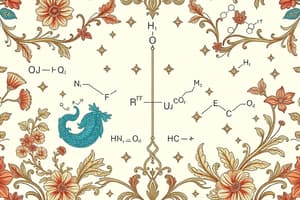Podcast
Questions and Answers
What type of chemical reaction occurs when yeast converts sugar into alcohol?
What type of chemical reaction occurs when yeast converts sugar into alcohol?
- Single displacement reaction
- Synthesis reaction
- Redox reaction (correct)
- Decomposition reaction
In a double displacement reaction between silver nitrate and copper sulfate, what are the expected products?
In a double displacement reaction between silver nitrate and copper sulfate, what are the expected products?
- Silver nitrate and copper sulfate
- Copper sulfate and silver nitrate
- Silver sulfate and copper nitrate
- Copper nitrate and silver sulfate (correct)
What is the outcome of an acid-base neutralization reaction?
What is the outcome of an acid-base neutralization reaction?
- Formation of two acids
- Release of oxygen gas
- Production of a base and an acid
- Creation of a salt and water (correct)
Which type of reaction is involved when two compounds trade places to create new compounds?
Which type of reaction is involved when two compounds trade places to create new compounds?
How do chemists benefit from understanding different types of chemical reactions?
How do chemists benefit from understanding different types of chemical reactions?
What type of chemical reaction involves the joining together of two or more simpler substances to produce a more complex substance?
What type of chemical reaction involves the joining together of two or more simpler substances to produce a more complex substance?
During the burning of wood, what are the products formed from the original elements of carbon and hydrogen?
During the burning of wood, what are the products formed from the original elements of carbon and hydrogen?
What type of reaction occurs when a compound breaks down into its constituent parts?
What type of reaction occurs when a compound breaks down into its constituent parts?
Which type of reaction involves one element replacing another in a compound?
Which type of reaction involves one element replacing another in a compound?
What is the main characteristic of combustion reactions?
What is the main characteristic of combustion reactions?
Which type of reaction involves the creation of larger or more complex molecules from simpler ones?
Which type of reaction involves the creation of larger or more complex molecules from simpler ones?
Study Notes
Chemical Reactions and Compounds: Types of Chemical Reactions
Chemical reactions involve the transformation of chemical substances into different forms or combinations, resulting in the production of new substances called products. These transformations take place according to various mechanisms and principles, forming diverse types of chemical reactions. Some common types of chemical reactions include:
Combination Reactions
These reactions involve the joining together of two or more simpler substances to produce a more complex substance. An example is the burning of wood, where carbon dioxide and water are produced as products from the original elements of carbon and hydrogen in the wood.
Decomposition Reactions
Decomposition occurs when a compound breaks down into its constituent parts. For instance, when sodium thiosulfate is added to acidified potassium iodide solution, it produces sulfur and iodine, along with sodium and potassium.
Synthesis or Combustion Reactions
Synthesis refers to the creation of larger or more complex molecules from simpler ones, while combustion is essentially oxidation accompanied by the release of energy. One example of combustion is the burning of coal, which consists of numerous organic compounds being rapidly combined with oxygen to produce carbon dioxide and water vapor, releasing heat.
Single-Displacement (Metathetic) Reactions
In these reactions, one element replaces another in a compound or two compounds exchange elements. An example is fermentation, where yeast converts sugar into alcohol, replacing the oxygen atom in the sugar molecule with hydrogen.
Double Displacement (Double Exchange) Reactions
Here, two compounds trade places to create two new compounds. The classic case is the double displacement reaction between silver nitrate and copper sulfate, producing copper nitrate and silver sulfate.
Acid-Base (Neutralization) Reactions
Acids and bases combine in neutralization reactions to produce a salt and water. For example, vinegar (acetic acid) and baking soda (sodium bicarbonate) when mixed, produce acetate salts and bubbles of carbon dioxide.
Understanding these types of chemical reactions helps chemists develop new materials, synthesize medicines, clean pollutants out of the environment, and gain insights into natural phenomena.
Studying That Suits You
Use AI to generate personalized quizzes and flashcards to suit your learning preferences.
Description
Explore the various types of chemical reactions such as combination, decomposition, synthesis, single-displacement, double displacement, and acid-base reactions. Learn how different substances transform into new products through these mechanisms.



